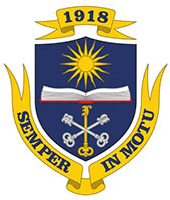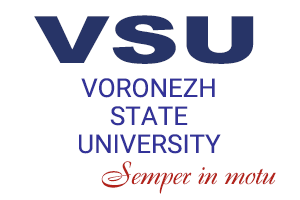The Faculty of Biomedical Sciences is the oldest faculty of Voronezh State University. Among its renowned graduates is Vladimir Demikhov (1916–1998), a Russian biologist, researcher, and experimentalist, one of the pioneers of transplantology.
At the moment, the faculty presents various areas of research in the field of biology, biomedicine, ecology, and soil science. It also trains bachelor’s degree students in biology, soil sciences, and ecology. Those who obtained a bachelor’s degree at VSU or any other university can enrol on a master’s degree programme at the faculty.
“The kind of training in medicine and biology provided by Voronezh State University is an important development factor for science and healthcare in the region. The faculty offers a number of basic medicine programmes, including medical biophysics, medical biochemistry, and medical cybernetics, that are unique for the Central Black Earth Region. The faculty has all the facilities for effective theoretical and practical training”, said Tatiana Popova, Dean of the Faculty of Biomedical Sciences.
At the moment, the faculty offers several master’s degree programmes in the following fields of study: biology, including programmes in biophysics, genetics, biochemistry, bioresources, and biomedical sciences, as well as in ecology and nature management (ecological safety).
The faculty also admits students to the following six-year specialist’s degree programmes: medical biophysics, medical biochemistry, and medical cybernetics. After completing these programmes, students can continue their training on a two-year residency programme in clinical laboratory diagnostics or a four-year PhD programme.
“I couldn’t even imagine myself as a biologist, yet alone a researcher. However, I changed my mind while studying at the faculty. It helped me to reveal my other self. When you conduct research, the process is as important as the result. Analysing new materials, determining problems, developing hypotheses, and confirming or disproving these hypotheses – these are great incentives for personal and professional growth. My job will help to develop basic science as well as to promote the introduction of new technologies in the industrial sector and in healthcare”, said Yulia Redko, a second-year master’s degree student and the scholarship holder of the Scholarship of the President of the Russian Federation and the Scholarship of the Government of the Russian Federation for academic and scientific achievements.
In 2017, the faculty opened a Simulation Diagnostic and Treatment Centre, which uses new multimedia education technologies based on training simulators, computer models, and manikins. In 2020, the faculty opened an educational and research centre of socially significant diseases and a laboratory for functional diagnostics and forensic science. In 2022, the faculty opened its accreditation and simulation centre for experts in medical biochemistry, biophysics, and cybernetics.
The faculty’s departments run a large number of training and research laboratories, including molecular biology, biochemistry, biophysics, physiology, microbiology, bionanotechnology, bioengineering, enzymology, zoology, botany, parasitology, ecology, agroecology, and genetics laboratories.
“It is not easy to study at our faculty, but it is while overcoming difficulties that you realise how versatile it actually is. You can always choose your own professional trajectory. For example, I can conduct research in biology and the systematics of invertebrates, which is the field I would like to investigate further”, said Konstantin Ivlev, a third-year bachelor’s degree student.
The faculty also has several museums, which are also part of the education process: Professor Barabash-Nikiforov Zoology Museum, Professor Khmelev Central Black Earth Region Vegetation Museum, Professor Aderikhin Soil Museum, and the Anatomy Museum, which is a unique place to study at for medicine students and it includes over 200 preparations in general anatomy and anatomical pathology, as well as operative surgery.
The faculty has an invaluable collection of scientific artefacts, including unique zoological and botanical collections that have been gathered for over two hundred years: a collection fund of invertebrates named after Professor K.V. Skufiin, a collection fund of vertebrate animals, and a herbarium named after Professor B.M. Kozo-Polyansky. The collections are comprised of hundreds of thousands of items collected by the most outstanding researchers. The faculty also has a vivarium used to study the pathogenesis of various diseases and develop methods for the correction of pathological disorders.
Every year, the Faculty of Biomedical Sciences implements a series of large research projects supported by grants of the President of the Russian Federation, Russian Science Foundation and within the framework of the state assignment to universities. The staff of the faculty also play key roles in joint research projects with Russian and international colleagues.
The Faculty of Biomedical Sciences produces a large number of young researchers. It has its own student research society, which focuses on a wide range of study fields that students are interested in.
“Our student research society is a great platform that facilitates communication between students of different years and programmes. The society gives its members the inspiration required for research activities. We are currently running a series of events aimed at raising students’ awareness of science. Soon we will be holding a series of event for young researchers, where we will discuss how to write scientific articles. Our students acquire public speaking skills and learn to present their projects. An important part are meetings with leading researchers, who can share their experience and help students to make their first steps on the road to science”, said Yulia Fedosova, a third-year bachelor’s degree student.
The faculty also runs branches of the leading scientific societies in Russia, including the Vavilov Society of Geneticists and Breeders, the Interregional Microbiology Society, the Biotechnology Society, etc.
The Faculty of Biomedical Sciences is devoted to the promotion of international cooperation with partner universities and strives to develop top-priority biomedical technologies. Besides the faculty’s own research centres and laboratories, the academic facilities for student training and research include leading research institutes, nature reserves, national parks, and healthcare institutions, centres, and laboratories in Voronezh. The faculty cooperates with a number of municipal institutions, including Voronezh Regional Clinical Diagnostic Centre, Voronezh Regional Clinical Oncology Centre, Children’s Clinical Hospital No. 1, the Blood Service of Voronezh Clinical Emergency Hospital No. 1, the family practice centre “Olymp zdoroviya”, the MedExpert diagnostic centre, etc.
The faculty's graduates find jobs in healthcare institutions and environmental organisations, research and biomedical institutions, sanitary and epidemiological laboratories, Rospotrebnadzor laboratories, forensic science laboratories, biotechnology companies, natural resources management agencies, industrial companies, etc.








